रंग पट्टिकाओं की सूची
यह रंग पट्टिकाओं की सूची एक लेख है, जो कम्प्यूटर ग्राफिक्स्, टर्मिनल एवं वीडियो गेम्स के प्रदर्शकों हेतु बना है।
रंग पट्टिका, जिसे रंग पैलेट भी कहते हैं, उसका केवल मात्र एक एक नमूना ही यहाँ दिया है।
नमूना परिक्षण सारणी, दी गई है।
एकवर्ण एवं रंगीन पैलेटों की सूची
एक वर्ण पैलेट
- इन पैलेटों में स्लेटी वर्ण के कुछ छायाएं हैं।

एकवर्ण (1-बिट)]]
black and white
2-bit ग्रेस्केल
22 = 4 स्लेटी स्तर
4-bit ग्रेस्केल]]
24 = 16 स्लेटी स्तर
8-bit ग्रेस्केल]]
28 = 256 स्लेटी स्तर
सामान्य RGB पैलेट
- इन पूर्ण RGB पैलेट में बराबर संख्या में बिट प्रयुक्त होतीं हैं, लाल, हरे एवं नीले रंग की उज्ज्वलता स्टोर करने हेतु। अतः इनमें सदा ही बराबर संख्या में स्तर प्रति चैनल होते हैं, एवं कुल संख्या में दो की घन श्रेणी यानी क्यूब में रंग होते हैं।

3-बिट RGB]]
23 = 8 रंग
6-bit RGB
43 = 64 colors
9-bit RGB
83 = 512 colors
12-bit RGB
163 = 4096 colors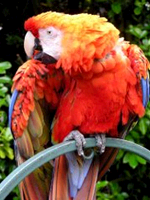
15-bit RGB
323 = 32,768 colors (हाई कलर)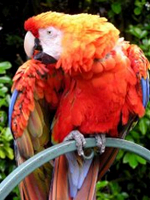
18-bit RGB]]
643 = 262,144 colors
24-bit RGB]]
2563 = 16,777,216 colors (ट्रू कलर)
असामान्य RGB पैलेट
- These are also RGB palettes, in the sense defined above (except for the 4-bit RGBI, which has an intensity bit that affects all channels at once), but either they do not have the same number of levels for each primary channel, or the numbers are not powers of two, so are not represented as separate bit fields. All of these have been used in popular personal computers.
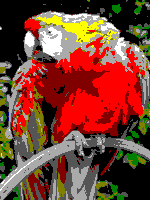
4-bit RGBI
23×2 = 16 colors
3-level RGB
33 = 27 colors
3-3-2 bit RGB
8×8×4 = 256 colors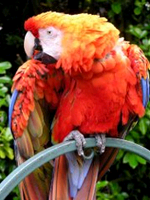
16-bit RGB
32×64×32 = 65,536 colors (HighColor)
List of software palettes
Systems that use a 4-bit or 8-bit pixel depth can display up to 16 or 256 colors simultaneously. Many personal computers in the later 1980s and early 1990s displayed at most 256 different colors, freely selected by software (either by the user or by a program) from their wider hardware's color palette.
प्रणाली की विशेषताएं
- These are selections of colors officially employed as system palettes in some popular operating systems for personal computers that features 8-bit displays.

Microsoft Windows default 16-color palette
16 colors
Microsoft Windows default 20-color palette
20 colors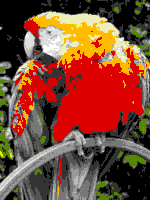
RiscOS default 16-color palette
16 colors
RGB प्रबन्ध
- These are selections of colors based on evenly ordered RGB levels, mainly used as master palettes to display any kind of image within the limitations of the 8-bit pixel depth.

6 level RGB
63 = 216 colors
6-7-6 levels RGB
6×7×6 = 252 colors
6-8-5 levels RGB
6×8×5 = 240 colors
8-8-4 levels RGB
8×8×4 = 256 colors
अन्य सामान्य प्रयोग

Grayscale palettes
up to 256 levels of gray
Color gradient palettes
up to 256 levels of any arbitrary hue
Adaptive palettes
up to 256 picked colors
False color palettes
up to 256 continuous-tone colors
कम्प्यूटर हार्ड्वेयर पैलेट की सूची
The color palettes of some of the most popular early personal computers and terminals. They may be based on RGB palettes, but also common are specific hardware-implemented 4, 16 or more colors palettes: not bit nor level combinations of RGB primaries, but fixed ROM/circuitry colors selected by the manufacturer.
Many of early models output composite video YPbPr colors. When seen on TV devices, the perception of the colors may be not corresponding with the value levels for the YPbPr values employed (most noticeable with NTSC TV color system).
For current RGB display systems for PC's (Super VGA, etc.), see the 16-bit RGB and 24-bit RGB for HighColor (thousands) and TrueColor (millions of colors) modes.
For video game consoles, see the List of videogame consoles section.
टर्मिनल एवं 8-bit मशीनें

Teletext (1976)
Graphic block characters, 8-color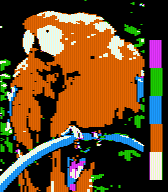
Apple II (1977)
Low 16- and high resolution 4-color graphic modes
Commodore VIC-20 (1981)
200 definible characters of 8×16 bits each, 8- or 10-color modes
CGA for IBM-PC (1981)
16-colors text mode, 4-color and monochrome graphic modes
Commodore 64 (1982)
Multicolor and High resolution 16-color graphic modes
ZX Spectrum (1982)
16-colors by attributes
MSX systems (1983)
"Screen 2" and "Screen 3" 15-color graphic modes
Commodore Plus/4 (1984)
Multicolor and High resolution 16-color graphic modes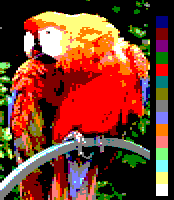
Amstrad CPC (1984)
Low 16-, medium 4- and high resolution 2-color graphic modes
MSX2 systems (1985)
"Screen 5" 16- and "Screen 8" 256-color graphic modes
MSX2+ systems (1988)
"Screen 10&11" 12,499- YJK+YAE and "Screen 12" 19,268-color YJK graphic modes
16-bit मशीनें

EGA for IBM-AT (1984)
Medium and high resolution 16-color graphic modesचित्र:Screen color test AtariST 16colors.png Atari ST (1985)
Low 16-, medium 4-color and high resolution monochrome modes
Commodore Amiga OCS (1985)
2-, 4-, 8-, 16- and 32-color standard graphic modes, EHB 64- and HAM 4096-color enhanced modes
Apple IIgs (1986)
Super High Res 4-, 8-, 16- and 256-color graphic modes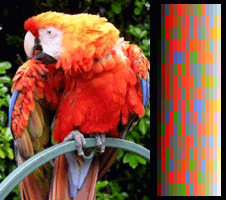
MCGA and VGA for IBM-AT (1987)
Medium 256- and high resolution 16-color graphic modes
वीडियो गेम प्रदर्शक पैलेटाँ की सूची
Color palettes of some of the most popular videogame consoles. The criteria are the same that of the List of computer hardware palettes section.
(No simulation available) Atari 2600
? out of 128 colors(No simulation available) NES
24 out of 56 colors(No simulation available) SuperNES
? out of 32,768 colors
Nintendo Gameboy
4 shades of green
Nintendo Gameboy Color
Type 1 cartridges tricky 10-color startup palettes and Type 3 32-color cartridges
Nintendo Gameboy Advance/SP/Micro
Type 3 32-color and Type 4 32,768-color cartridges
SEGA Master System
32-color out of 64चित्र:Screen color test SEGAGameGear.png SEGA Game Gear
32-color out of 4,096(No simulation available) SEGA Mega Drive/Genesis
61-color out of 512
